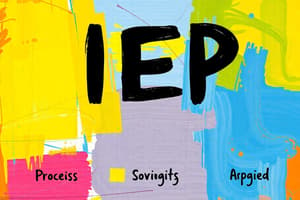Podcast
Questions and Answers
What is the key component of successful IEP meetings related to negotiation?
What is the key component of successful IEP meetings related to negotiation?
Building consensus among participants by making concessions and reaching mutually beneficial agreements.
How can empathy support the feelings of participants in IEP meetings?
How can empathy support the feelings of participants in IEP meetings?
Acknowledge the emotions of all parties involved.
What is the significance of showing patience in IEP meetings?
What is the significance of showing patience in IEP meetings?
To demonstrate understanding for the various perspectives and opinions discussed.
How can participants search for serenity in IEP meetings?
How can participants search for serenity in IEP meetings?
What role does respect play in maintaining a collaborative spirit in IEP meetings?
What role does respect play in maintaining a collaborative spirit in IEP meetings?
What does diplomacy in IEP meetings refer to?
What does diplomacy in IEP meetings refer to?
Who are the stakeholders involved in IEP meetings?
Who are the stakeholders involved in IEP meetings?
Why is diplomacy essential in IEP meetings?
Why is diplomacy essential in IEP meetings?
What are the competencies required for diplomacy in IEP meetings?
What are the competencies required for diplomacy in IEP meetings?
How can conflict resolution be approached in IEP meetings?
How can conflict resolution be approached in IEP meetings?
Study Notes
Exploring IEP Meetings: Diplomacy, Support, and Serenity
Individualized Education Program (IEP) meetings are a crucial aspect of the educational journey for students with disabilities or unique learning needs. These gatherings are characterized by a collaborative approach that aims to promote the success of each student by outlining educational goals, strategies, and accommodations tailored to their specific needs. In this article, we will delve into three key facets of IEP meetings: diplomacy, support of feelings, and search for serenity.
Diplomacy in IEP Meetings
Diplomacy in IEP meetings refers to the ability of the participants to communicate effectively, listen with empathy, and engage in open dialogue. This collaborative process requires the active participation of various stakeholders, including parents, teachers, school administrators, and support staff. Diplomacy becomes essential when addressing sensitive topics and discussing contentious issues such as the appropriateness of certain accommodations or the role of specific support services.
Diplomacy requires the following competencies:
- Active listening: With empathy, listening to the concerns and opinions of all participants.
- Effective communication: Expressing thoughts and ideas clearly and concisely.
- Conflict resolution: Addressing disagreements in a constructive manner, focusing on finding solutions that benefit the student.
- Negotiation: Building consensus among participants by making concessions and reaching mutually beneficial agreements.
Support of Feelings in IEP Meetings
The emotional well-being of the student, their parents, and the IEP team members is a critical component of successful IEP meetings. When emotions are acknowledged and validated, the quality of the decision-making process improves, and the collaborative spirit is strengthened.
To support the feelings of IEP meeting participants, consider the following strategies:
- Empathy: Acknowledge the emotions of all parties involved.
- Patience: Show understanding for the various perspectives and opinions discussed.
- Validation: Affirm the legitimacy of the feelings expressed by participants.
- Compassion: Demonstrate care and concern for the well-being of all involved.
- Flexibility: Be open to changes in the IEP plan based on the evolving needs of the student.
Search for Serenity in IEP Meetings
IEP meetings can be emotionally charged, and finding a sense of peace and tranquility in the midst of these discussions is a valuable goal. When participants are able to find serenity, they are better equipped to make informed decisions, prioritize the student's needs, and maintain a collaborative spirit.
To search for serenity in IEP meetings, consider the following strategies:
- Mindfulness: Focus on the present moment and avoid becoming overwhelmed by past mistakes or future concerns.
- Composure: Keep emotions in check and maintain a calm demeanor during discussions.
- Respect: Show respect for the opinions and perspectives of all participants, even when they differ from your own.
- Gratitude: Acknowledge the contributions of each participant and express appreciation for their efforts.
- Trust: Foster a climate of trust and fairness among IEP meeting participants.
In conclusion, IEP meetings are a critical component of the educational journey for students with disabilities or unique learning needs. By focusing on diplomacy, supporting the feelings of all participants, and searching for serenity, IEP meetings can be transformative, providing a positive and collaborative environment for all stakeholders. As a result, students with disabilities are better equipped to achieve their educational goals and thrive in their learning environment.
Studying That Suits You
Use AI to generate personalized quizzes and flashcards to suit your learning preferences.
Description
Delve into the essential aspects of Individualized Education Program (IEP) meetings for students with disabilities or unique learning needs. Explore the importance of diplomacy, emotional support, and finding serenity in these crucial gatherings to ensure collaborative and successful outcomes.




